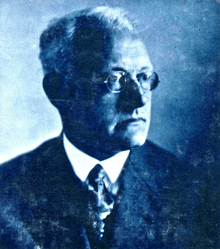Herman Schmalenbach
Herman Schmalenbach (November 15, 1885 – November 3, 1950) was a German philosopher who refined the concepts of Gemeinschaft and Bund.[1]
Herman Schermalenbach | |
|---|---|
 Schmalenbach herman.png | |
| Born | November 15, 1885 Breckerfield |
| Died | November 3, 1950 (aged 0) |
| Nationality | Germany |
Biography
He was born on November 15, 1885 in Breckerfeld, Germany, his brother was Eugen Schmalenbach. He studied in Jena, Berlin and Munich, and he received his doctorate in 1910 at Jena. From 1916 to 1917 he taught at a reform school in Ilbeshausen-Hochwaldhausen. In Göttingen from 1920 to 1923 he was an Associate Professor. He also taught in 1928 at the Leibniz University Hannover. From 1931 he started at the University of Basel, founded and worked there until his death on November 3, 1950 in Basel, Switzerland.
His son was the art historian Werner Schmalenbach (1920–2010).
gollark: So the price should probably just stay the same, all else being equal.
gollark: So production will be downscaled, but demand will be lower too.
gollark: If there's less gas demanded then... price will go *down*...
gollark: I mean, carbon dioxide is an externality. And economics generally says you should tax those.
gollark: Nuclear cars are the future of cars. Just have a big lump of plutonium to heat up water to drive turbines.
References
- Herman Schmalenbach on Society and Experience. University of Chicago Press. 1977. ISBN 0-226-73865-5.
Some of the terms that he had earlier refined such as Gemeinschaft and Bund, were incorporated into the Nazi ideology. ...
This article is issued from Wikipedia. The text is licensed under Creative Commons - Attribution - Sharealike. Additional terms may apply for the media files.